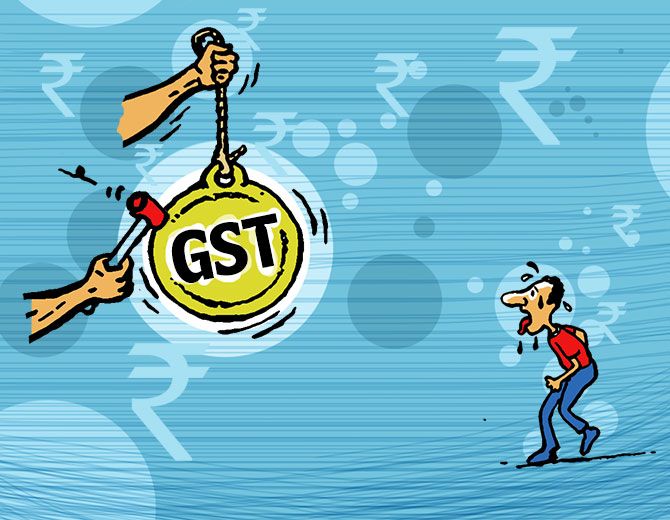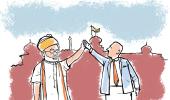The showdown between the Centre and states, which started with delays in the monthly payment of compensation to states for loss of revenue from the rollout of GST, escalated into shedding of the consensual approach to decision making for the very first time at the 38th meeting of the GST Council.
Illustration: Dominic Xavier/Rediff.com

In a development with far-reaching implications, non-BJP ruled states on Wednesday said the Union government may be headed for a sovereign default as it has refused to assure them of paying on time the GST dues guaranteed to them through a Constitutional amendment.
The showdown between the Centre and states, which started with delays in the monthly payment of compensation to states for loss of revenue from the rollout of Goods and Services Tax, escalated into shedding of the consensual approach to decision making for the very first time at the 38th meeting of the GST Council.
While Union Finance Minister Nirmala Sitharaman reiterated her stand that the central government was committed to cooperative federalism, finance ministers of non-BJP ruled states such as Punjab and Kerala said she refused to give a categorical assurance that states will be paid compensation on time.
"There is no gap within the Council. I don't know if it exists anywhere. In the Council, and in the Rajya Sabha, I have explained in detail about how we remain committed to cooperative federalism, and also to keep up all other promises given on GST," Sitharaman said.
Speaking after attending the meeting of the GST Council -- the highest decision making body of the new tax regime, Punjab Finance Minister Manpreet Singh Badal said it was a sad day as the "Union Finance Minister could not give assurance whether states will be paid on time or not."
"We were aware that revenue position was grim but we were not aware that it was grim to an extent where the Union Finance Minister could not give assurance in the Council whether states would be paid on time or not," he said.
"As far as I am concerned, I think it is just close to a sovereign default where the Government of India is unable to pay its constitutional obligation."
He said when GST was launched with much fanfare in July 2017, states were "led to believe revenue would go up, GDP growth would go up. Unless the Government of India can fix revenue concerns very quickly, the whole consensus on GST would unravel.
“I don't think we need to be in panic mode. Things can be fixed. I want to say they need to be fixed quickly."
Kerala Finance Minister Thomas Isaac said the Centre had sufficient money in the GST Compensation Fund but delayed payments since August.
"It is great disappointment that they are not even able to assure that they will give us our due."
He said the Council has in its minutes recorded assurance of the former union finance minister Arun Jaitley, under whom the GST was rolled out, that in case of a shortfall in the compensation fund, the Council can borrow and pay states.
The period for levy of compensation cess may then be extended from five to six years to pay for the debt.
West Bengal Finance Minister Amit Mitra said the country was staring at stagflation -- inflation with stagnant growth -- and there will be no compensation money after February to pay the states.
In the Council meeting, the panel resorted to voting to decide whether a uniform tax on lotteries should be levied or a two-rate system be followed.
Decisions in the previous 37 meetings of the GST Council, headed by the Union Finance Minister and comprising representatives of all states and UTs, had been taken unanimously.
These included fixing of tax rates on dozens of goods and services but never had voting been done to decide on the issue.
However, when the issue of levy of GST on lottery came up at the 38th meeting of the Council, consensus remained elusive, sources said.
This led to a vote being taken to decide on the issue of interest to seven states where lottery is legal.
As many as 21 states, mostly BJP ruled, voted for a uniform 28 per cent GST rate from March 1, overriding objections from others, they said, adding seven voted against it.
Currently, dual GST rates are imposed on lotteries.
The lottery industry has been pressing for a uniform GST rate of 12 per cent and removal of tax on the prize money, saying the existing dual rate is hampering growth of the business.
Currently, GST of 12 per cent is levied on state lotteries sold within a state and 28 per cent on those sold outside that state.
Sitharaman said consensus is a tradition but not a rule.
"Every attempt was made to keep that set tradition alive.
“But eventually, the Council was reminded that the rules allow (voting) and the tradition is not part of the rule book," she said when asked by reporters about the voting on the lottery issue.
"It (voting) is not imposed by the Council, it is not imposed by me as a chair but it was on request of one member," she said.
Sources said that Kerala Finance Minister Thomas Isaac wanted division on the proposal of uniform GST rate on lottery.
On payment of compensation, Sitharaman said she reiterated the government's commitment to cooperative federalism and meeting its obligations at the Council meeting.
She said one tranche of compensation for August and September was released just a couple of days back.
Sitharaman had in the Rajya Sabha on December 12 stated that in 2017-18, the total cess collected was Rs 62,596 crore, of which Rs 41,146 crore was released to states.
The remaining Rs 15,000 crore was accumulated in the cess fund. In the next year, Rs 95,081 crore was collected and Rs 69,275 crore released.










